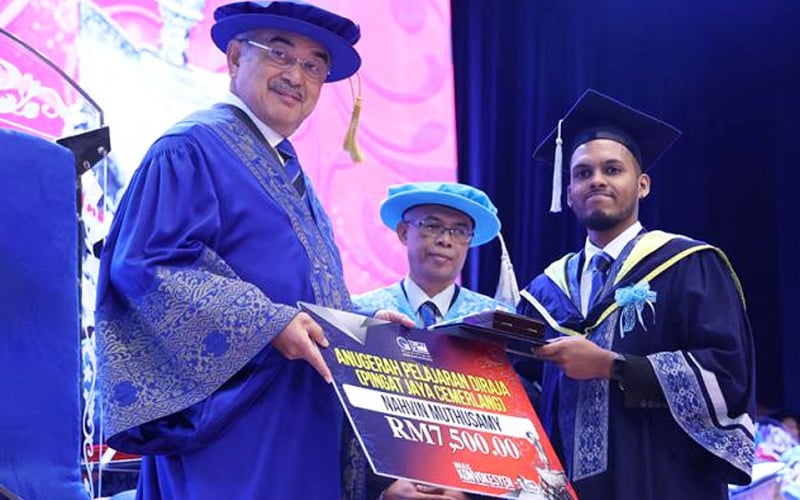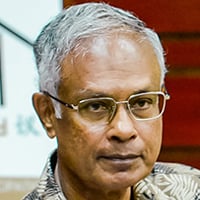FMT:
Sudden switch to meritocracy in education may cause unrest, says ex-MP
Dr Michael Jeyakumar Devaraj says current ethnic quotas should be aligned to population ratios, with students’ socio-economic status taken into account.

M Nahvin, a computer science student who received the Royal Education Award, recently spoke about the need for university admissions to be based on merit.
PETALING JAYA: Malaysia is not ready for meritocratic practices in its education system, according to Parti Sosialis Malaysia chairman Dr Michael Jeyakumar Devaraj.
He said a sudden shift to meritocracy could exacerbate political and social unrest if it resulted in professional courses being filled with an overwhelming majority of non-Bumiputera students.
“Any system must be fair to all. This is also not something that is politically feasible or acceptable. It’s going to cause a lot of unhappiness,” he told FMT in an exclusive interview.
Proposals for university admissions to be based on merit have arisen out of discontent with the current quota system by which non-Malays from lower economic backgrounds have missed out on opportunities for higher education.
Last month, M Nahvin, a distinguished student at a local university, highlighted the need for meritocracy in Malaysian education in a speech when receiving the Royal Education Award. He pointed out the case of a friend with similar SPM results who couldn’t secure a matriculation spot.
Jeyakumar, a former MP for Sungai Siput, said ethnic quotas should be maintained, but aligned to the population ratios and incorporate students’ socio-economic status as a factor.
PETALING JAYA: Malaysia is not ready for meritocratic practices in its education system, according to Parti Sosialis Malaysia chairman Dr Michael Jeyakumar Devaraj.
He said a sudden shift to meritocracy could exacerbate political and social unrest if it resulted in professional courses being filled with an overwhelming majority of non-Bumiputera students.
“Any system must be fair to all. This is also not something that is politically feasible or acceptable. It’s going to cause a lot of unhappiness,” he told FMT in an exclusive interview.
Proposals for university admissions to be based on merit have arisen out of discontent with the current quota system by which non-Malays from lower economic backgrounds have missed out on opportunities for higher education.
Last month, M Nahvin, a distinguished student at a local university, highlighted the need for meritocracy in Malaysian education in a speech when receiving the Royal Education Award. He pointed out the case of a friend with similar SPM results who couldn’t secure a matriculation spot.
Jeyakumar, a former MP for Sungai Siput, said ethnic quotas should be maintained, but aligned to the population ratios and incorporate students’ socio-economic status as a factor.

Dr Michael Jeyakumar Devaraj.
For example, he said, since Bumiputeras made up 70% of the population, about 40% to 50% of medical seats should go to Bumiputeras from the B40 group, fewer to the M40 and fewer still to Bumiputeras in the T20 group.
The same principle should apply to other ethnic groups, such as the Indian community, where a fair distribution among different economic strata within the community should be practised, he added.
Jeyakumar said the current quota system often benefited wealthier segments more than those at “the bottom of the pile”, a trend that he said must change.
However, he said there was a need for minimum academic standards to maintain quality, and suggested additional preparatory courses for those who needed them.
“Otherwise, you risk admitting sub-par candidates. If they are truly determined to study medicine, they might consider taking an extra one or two years of pre-medical studies to enhance their basic science knowledge, develop their critical thinking, and improve their language abilities to a level sufficient for handling the medical course effectively.” .
Jeyakumar said this would also be fair to future patients treated by these professionals.
In July, Prime Minister Anwar Ibrahim said the quota system at public universities in the country would be retained but students who excelled in their studies would get places in institutes of higher learning.
He said the quota system would continue to be implemented to achieve a balance of Malay and Bumiputera students in universities.
For example, he said, since Bumiputeras made up 70% of the population, about 40% to 50% of medical seats should go to Bumiputeras from the B40 group, fewer to the M40 and fewer still to Bumiputeras in the T20 group.
The same principle should apply to other ethnic groups, such as the Indian community, where a fair distribution among different economic strata within the community should be practised, he added.
Jeyakumar said the current quota system often benefited wealthier segments more than those at “the bottom of the pile”, a trend that he said must change.
However, he said there was a need for minimum academic standards to maintain quality, and suggested additional preparatory courses for those who needed them.
“Otherwise, you risk admitting sub-par candidates. If they are truly determined to study medicine, they might consider taking an extra one or two years of pre-medical studies to enhance their basic science knowledge, develop their critical thinking, and improve their language abilities to a level sufficient for handling the medical course effectively.” .
Jeyakumar said this would also be fair to future patients treated by these professionals.
In July, Prime Minister Anwar Ibrahim said the quota system at public universities in the country would be retained but students who excelled in their studies would get places in institutes of higher learning.
He said the quota system would continue to be implemented to achieve a balance of Malay and Bumiputera students in universities.
Talent, intelligence and ability arise from all levels of society.
ReplyDeleteChance diminishing with increasing spoon-fed!
DeleteThe worst period of Race -based Higher education quotas in Malaysia was actually in the mid-1970s to about 1990.
ReplyDeleteThose were the years when quotas were overwhelmingly set for Boomis. And there was no alternative outlet such as Private Higher Education in those days other than TAR College.
The current unhappiness arise because the policies have mutated into FOREVER quotas, the Never Ending Policy.
The FOREVER Tongkat Ali.
Protection
ReplyDeleteTemporary Protection or Quotas are often necessary for Fairness.
ReplyDeleteNobody is talking about suddenly removing Quotas.
Protecting something Forever turns them into failures. Just see what happened to Proton...steadily failed and ultimately forced to sell to Gheely.
Now Proton is Kebanggaan Gheely.